Star Trek: The Eugenics War, Vol. 1 Read online
GREG COX
The Rise and Fall of Khan Noonien Singh
VOLUME ONE
Based upon STAR TREK ® and STAR TREK: THE NEXT GENERATION® created by Gene Roddenberry, STAR TREK: DEEP SPACE NINE® created by Rick Berman & Michael Piller, and STAR TREK: VOYAGER® created by Rick Berman & Michael Piller & Jeri Taylor
This book is a work of fiction. Names, characters, places and incidents are products of the author's imagination or are used fictitiously. Any resemblance to actual events or locales or persons, living or dead, is entirely coincidental.
Copyright © 2001 Paramount Pictures. All Rights Reserved.
This book is published by Pocket Books, a division of Simon & Schuster, Inc., under exclusive license from Paramount Pictures.
All rights reserved, including the right to reproduce this book or portions thereof in any form whatsoever. For information address Pocket Books, 1230 Avenue of the Americas, New York, NY 10020
ISBN: 0743422597
POCKET and colophon are registered trademarks of Simon & Schuster, Inc.
Visit us on the World Wide Web:
http://www.SimonSays.com
http://www.startrek.com
CONTENTS
Prologue
Chapter One
Chapter Two
Chapter Three
Chapter Four
Chapter Five
Chapter Six
Chapter Seven
Chapter Eight
Chapter Nine
Chapter Ten
Chapter Eleven
Chapter Twelve
Chapter Thirteen
Chapter Fourteen
Chapter Fifteen
Chapter Sixteen
Chapter Seventeen
Chapter Eighteen
Chapter Nineteen
Chapter Twenty
Chapter Twenty-One
Chapter Twenty-Two
Chapter Twenty-Three
Chapter Twenty-Four
Chapter Twenty-Five
Chapter Twenty-Six
Chapter Twenty-Seven
Chapter Twenty-Eight
Chapter Twenty-Nine
Chapter Thirty
Chapter Thirty-One
Chapter Thirty-Two
Chapter Thirty-Three
Chapter Thirty-Four
Chapter Thirty-Five
Afterword
For Cyn and Dave
Acknowledgments
As history teaches us, nobody fights the Eugenics Wars alone. Thanks to my editor, John Ordover, for enlisting early on; to my agents, Russ Galen and Anna Ghosh, for securing vital defense funding, and to the entire Malibu Lunch Group for providing countless hours of R&R during the war years.
I also want to thank Sumi Lee for German lessons, Kim Kindya for fashion tips and Cuban profanities, Josepha Sherman and Amy Goldschlager for eyewitness reports on Lenin's Tomb, Marina Frants for tips on Russian grammar and vocabulary, the Star Trek Timeliners for advice regarding stardates, and, of course, Robert Lansing, Teri Garr, and Ricardo Montalban for inspiration.
Finally, thanks to Karen Palinko, for careful proofreading and keen editorial insights, and to Alex, for having a much better attitude than Isis.
“We want no Caesars.”
—JAWAHARLAL NEHRU, first prime minister of India
PROLOGUE
Captain's log, stardate 7004.1.
Under top-secret orders from Starfleet Command, the Enterprise is en route to the Paragon Colony on the planet Sycorax, to evaluate that colony's recent request to join the United Federation of Planets. At issue is one of the Federation's fundamental principles, a centuries-old taboo perhaps second only to the Prime Directive in its scope and sanctity. . . .
“GENETIC ENGINEERING? ON HUMANS?” DR. LEONARD MCCOY WAS UTterly, and audibly, aghast. He stared across the conference table at his friend and captain, James T. Kirk, as if he couldn't believe what he was hearing. The doctor's sagging, careworn features looked even more vexed than usual. “Have the brass at Starfleet lost their paper-pushing little minds? Human genetic engineering has been banned throughout the Federation since its very founding—and for good reason!”
Kirk smiled at his friend's predictably cantankerous response. Along with Mr. Spock, the three men were alone in the ship's primary conference room, Starfleet regarding the full particulars of this mission to be on a strictly need-to-know basis. Kirk sat at the head of the long, rectangular table, with Spock and McCoy facing each other across the polished brown surface of the table. I should have known McCoy would react this way, Kirk thought.
“Calm down, Bones,” he instructed McCoy. “Nobody's talking about lifting the ban right away, just rethinking it a bit. After all, it's been three hundred years since the Eugenics Wars; a case could be made that people are a lot more civilized these days, that we wouldn't necessarily make the same mistakes our ancestors did.”
“Even when those mistakes nearly destroyed all life on Earth?” McCoy shook his head vehemently. “Civilization may be more advanced, but I'm not sure people themselves are any smarter, especially when it comes to messing around with our own genetic blueprint.” The doctor gave Kirk a probing look. “Good Lord, Jim, you met Khan. Don't you remember what sort of a monster he was?”
Kirk nodded, his expression growing more sober at the mention of that name. Only four years had passed since the captain had made the mistake of reviving the genetically enhanced crew of the S. S. Botany Bay, all of whom had been trapped in suspended animation since fleeing the Earth in the 1990s, following their disastrous defeat in the infamous Eugenics Wars. Their charismatic leader, Khan Noonien Singh, had briefly captured the Enterprise —and nearly killed Kirk— before the captain had managed to turn the tables on Khan and his fellow supermen, stranding them on a primitive planet somewhere near the Mutara Sector. That was a close call, Kirk remembered; he couldn't blame McCoy for citing the very existence of Khan as a compelling argument against the sort of genetic tampering under discussion.
“Your point is well taken, Doctor,” Kirk assured him. “In fact, it's our firsthand experience with Khan and his followers that persuaded Commodore Mendez to assign this fact-finding mission to the Enterprise. Our recommendations will carry a lot of weight with the Federation Council when they meet to decide the future of the colony on Sycorax.”
“You mean, your recommendation is the one the Council will listen to,” McCoy insisted without any rancor. The doctor seemed somewhat mollified now that his misgivings had received an attentive hearing by Kirk. “So what's the story with this so-called Paragon Colony anyway? How in blue blazes did we end up with a community of genetically engineered humans here in the twenty-third century?”
Kirk let Spock fill McCoy in on the background of the colony. “The galaxy is a large place,” the Vulcan explained, “and spacious enough that those who object to their society's policies can establish their own communities far beyond the boundaries of any controlling authority. To be more specific, the Paragon Colony was founded over a century ago, outside the Federation's sphere of influence, by individuals who sought to create a genetically engineered society. The colony has had little or no contact with the outsiders until very recently, when they discreetly appealed for membership in the Federation. In exchange for said membership, they offer the Federation generations of expertise in human genetic engineering.”
“Which just happens to violate one of our oldest and wisest laws!” McCoy pointed out acerbically. “And the higher-ups back home are seriously considering this notion?” He rolled his eyes heavenward. “God help us!”
“To be honest, Bones,” Kirk confided in him, “it's Starfleet that's most interested in the colony's proposal,
for reasons of galactic security. Even before this Paragon business came up, there had been some highly hush-hush discussions about repealing, or at least loosening, the restrictions on human eugenics programs. A few of our top strategists have called Starfleet's attention to the fact that humanity is threatened by species such as the Romulans and Klingons, who are physically superior to ordinary humans in many ways. They argue that we need to close the ‘genetic gap’ by breeding enhanced humans who can stand toe-to-toe with whatever alien species we encounter. There are even rumors that the Klingons have already launched covert genetic-engineering projects of their own, and that we may be falling behind in a genetic arms race.”
McCoy looked positively appalled. “The Klingons are rushing over an evolutionary cliff, so we have to hurry up and join them? That's the kind of reasoning that nearly blew humanity to kingdom come centuries ago.” A passionate urgency crept into McCoy's voice as he leaned toward Kirk. “I can't speak for the Romulans, Jim, but I'm darn sure that we poor humans aren't ready to play God with our own chromosomes just yet. Good Lord, we're talking about the very stuff that makes us human in the first place.”
His slender fingers steepled before him in a contemplative pose, Spock took a more objective perspective. “Despite humanity's own unfortunate experiences, a number of other sentient species have indulged in eugenics without suffering the adverse consequences recorded in your history. Take the Hortas of Janus VI, for instance: Once every fifty thousand years, they choose the best of their generation to be the sole mother of the next generation of Hortas, thus employing selective breeding to steadily improve their species.” Spock directed an ironic glance at McCoy. “As you yourself can testify, Doctor, this process has produced a remarkably civilized and intelligent life-form.”
Kirk repressed a smile, amused as ever by his friends' familiar antagonism. He could always count on Spock and McCoy to land on opposite sides of every issue; that was just one of the reasons he made it a rule to always listen carefully to both of them.
“I should have known you'd be in favor of this lunatic proposition,” McCoy drawled, eyeing Spock dubiously. “What else could one expect from someone whose people have done their damnedest to breed honest emotion out of their own blood and bones?”
Spock was characteristically unfazed by the doctor's outburst. “The Vulcan repudiation of emotion,” he corrected McCoy, “is the result of over two millennia of intellectual and philosophical discipline, and not a matter of mere biology. Furthermore, I did not say that I supported the Paragon Colony's petition to join the Federation; at present, there is insufficient data on which to make that decision. I merely observed that, on the basis of galactic history, genetic engineering and the selective breeding of sentient beings cannot be considered socially irresponsible by definition.”
McCoy sighed wearily. “Why do I even try to talk sense to you, you pointy-eared, walking tricorder?” He sank back into his chair and regarded Kirk quizzically. “What about you, Jim? What do you think about all this?”
Good question, the captain thought. His initial response to the commodore's classified communication had echoed McCoy's: Why risk creating another Khan? On further reflection, though, he felt obliged to give the matter deeper thought. The original ban on tinkering with human DNA had been drafted by a generation for whom the atrocities of the Eugenics Wars were still recent history; it could be argued that such sweeping and unconditional legislation had been an overreaction to the crimes of Khan and his contemporaries. Perhaps it was time to take another, less emotional look at the potential pros and cons of human genetic engineering . . . ?
“I believe it was Samuel Hopkins of the First Continental Congress who said he had never encountered an issue so dangerous that it couldn't be talked about,” Kirk stated firmly. “With that in mind, gentlemen, I intend to keep an open mind until we arrive at Sycorax and hear what the colonists have to say. I also want to see for myself just what a genetically engineered society looks like.” He rose from his seat at the head of the table. “That concludes this briefing. Thank you for coming, Bones, Mr. Spock. You may return to your duties now. Please keep the specifics of our mission to Sycorax confidential for the time being; there's no point in stirring up controversy before Starfleet has decided on a suitable course of action.”
“Whatever you say, Jim,” McCoy agreed, standing up and stepping away from the table. “I don't envy you the decision you have to make; talk about being on the hot seat.” Automatic doors whished open as McCoy headed for the exit; he paused in the doorway to look back at Kirk. “You know my door is always open if you want to talk about it.”
“Thank you, Bones. I'll keep that in mind.” Spock lingered behind while the door slid shut behind McCoy, cutting off the sounds of the busy corridor outside. “What can I do for you, Mr. Spock?” Kirk asked.
The Enterprise 's first officer stood behind his seat, his impeccable posture and dignified bearing betraying his Vulcan roots as surely as the tapered points of his ears and the slightly greenish cast of his complexion. “A word of advice, Captain. While I do not share the good doctor's excessively visceral reaction to the matter at hand, his suggestion that you look to the history of your own world is not without merit. As we have learned through our own experiences in the past, the latter part of the twentieth century was an extremely volatile period in Earth's history, in which, besides Khan and his fellow genetic tyrants, a number of crucial variables were at work, including, for example, the covert activities of Gary Seven and his associates.”
That's right, Kirk thought. Seven, an undercover operative for an unknown alien civilization, would have been a contemporary of Khan, more or less. Indeed, Kirk recalled, Spock's subsequent research had revealed that both Seven and his partner, a young woman named Roberta Lincoln, had ultimately played key roles in the cataclysmic drama of the Eugenics Wars. “I wonder what Seven's take on the Paragon Colony would be.”
“That we can only speculate upon,” Spock observed. “His actions in the past, however, are a matter of historical record.” He stepped away from the conference table and headed for the door. “The future of the human race remains to be charted, Captain, but a fuller knowledge of the past can only inform your decisions in the days to come.”
Kirk nodded solemnly. “An excellent suggestion, Mr. Spock.” He glanced at the triangular computer node rising from the center of the conference table. “How long until we reach Sycorax?” he asked his science officer.
“At our current rate of speed,” Spock reported, swiftly performing the necessary calculations in his head, “approximately seventy-two hours, thirty-four minutes.”
Time enough to do a fair amount of historical research, Kirk concluded. It dawned on him that it had been years since he had last reviewed the grim, tumultuous saga of the Eugenics Wars, and that there was much he still did not know about that fateful era. “Please take the bridge, Mr. Spock. I believe I'll remain here for a while more, doing just as you advised.”
“Very good, Captain. I will leave you to your studies.” Spock left, and Kirk found himself alone within the sloping blue walls of the conference room. With only his thoughts to keep him company, he listened for a few moments to the steady, reassuring hum of his starship, then took a seat midway down the length of the table.
“Computer, access Earth historical records for the late twentieth century. Begin with the first citation relevant to the topic designated ‘Eugenics Wars.’ ”
The miniature viewscreen facing Kirk flashed in acknowledgment. “Processing request for data,” stated a familiar feminine voice, the voice of the Enterprise computer. “Beginning historical display now. . . .”
CHAPTER ONE
EAST BERLIN
GERMAN DEMOCRATIC REPUBLIC
MARCH 14, 1974
ROBERTA LINCOLN PACED NERVOUSLY OUTSIDE THE RUSSIAN EMBASSY, hugging herself against the chill of the cold night air. The monumental stone edifice, built in a stolid, neoclassical style, loomed behind the young
blond woman, silent and dark. Roberta peered at her wristwatch; it was ten past two in the morning, only ninety seconds later than the last time she'd checked her watch. What's keeping Seven and that darn cat? she wondered anxiously. They should be back by now.
Restless and apprehensive, she strolled down the sidewalk, wincing at the sound of her own heels clicking against the pavement. The echo of her footsteps rang out far too loudly for Roberta's peace of mind. The last thing she wanted to do was attract the attention of the local cops or, worse yet, one of the innumerable informants working for the Stasi, the dreaded East German secret police.
Fortunately, Unter den Linden, the wide city boulevard running north past the embassy, seemed deserted at this ridiculously late hour. The only traffic she heard was an elevated train rattling by a few streets over. Roberta clung to the shadow cast by the huge building, keeping a safe distance from the streetlamps at either end of the block, while also maintaining a careful lookout for any sign of trouble. “C'mon, c'mon,” she muttered impatiently, wishing Seven could hear her. You'd think I'd be used to this sort of thing by now, she thought; after all, she'd been working with Gary Seven, alias Supervisor 194, for nearly six years now, ever since that unforgettable afternoon in 1968 when she'd shown up for what she'd thought was an ordinary secretarial job, only to find herself caught up in a bizarre happening involving nuclear missiles, talking computers, and a starship from the future.
Heck, she mused, what's a little East German espionage compared to some of the spacey shenanigans Seven has dragged me into over the last few years? Nevertheless, she shivered beneath a heavy gray overcoat, and not just from the cold. The thick wool garment she wore was neither flattering nor fashionable, but it helped to preserve her anonymity while simultaneously warding off at least some of the winter's chill. A black beret and matching kerchief, the latter tied below her chin, concealed most of her tinted honey-blond hair, while her gloved hands were thrust deeply into the pockets of her coat for warmth. Her fidgety fingers toyed with a thin silver device, snugly stowed away in the right pocket, that looked and felt like a common fountain pen. A mere pen, however, wouldn't have reassured Roberta nearly as much as this particular mechanism, even as she prayed devoutly that she wouldn't have need to use the servo before this night was over.

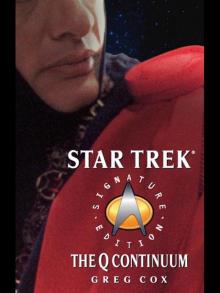 Q-Space
Q-Space Godzilla - the Official Movie Novelization
Godzilla - the Official Movie Novelization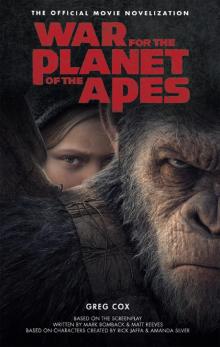 War for the Planet of the Apes: Official Movie Novelization
War for the Planet of the Apes: Official Movie Novelization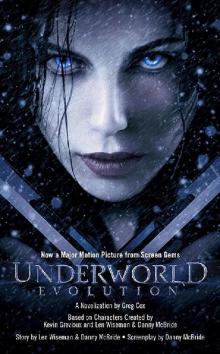 Underworld: Evolution
Underworld: Evolution Underworld
Underworld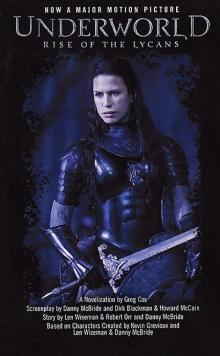 Rise of the Lycans
Rise of the Lycans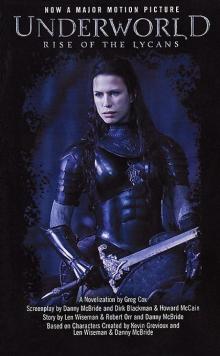 04 - Rise of the Lycans
04 - Rise of the Lycans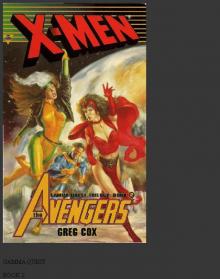 X-Men and the Avengers: Search and Rescue
X-Men and the Avengers: Search and Rescue Child of Two Worlds
Child of Two Worlds Welcome to Promise City
Welcome to Promise City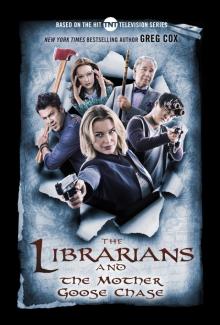 The Librarians and the Mother Goose Chase
The Librarians and the Mother Goose Chase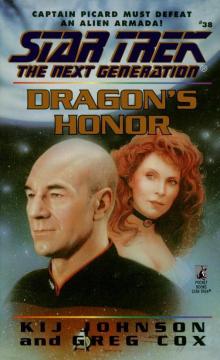 Dragon's Honor
Dragon's Honor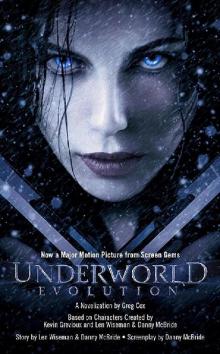 03 - Evolution
03 - Evolution DC Comics novels--Batman
DC Comics novels--Batman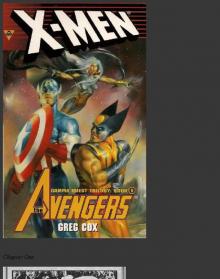 X-Men and the Avengers: Lost and Found
X-Men and the Avengers: Lost and Found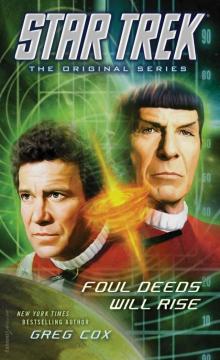 Foul Deeds Will Rise
Foul Deeds Will Rise 02 - Blood Enemy
02 - Blood Enemy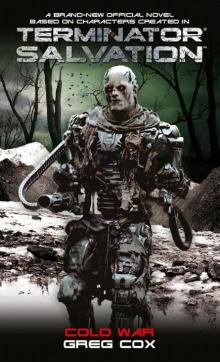 Terminator Salvation: Cold War
Terminator Salvation: Cold War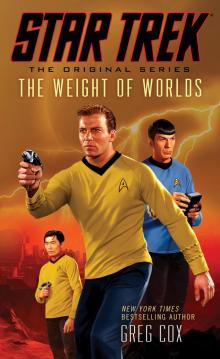 The Weight of Worlds
The Weight of Worlds The Antares Maelstrom
The Antares Maelstrom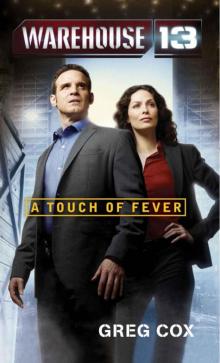 Warehouse 13: A Touch of Fever
Warehouse 13: A Touch of Fever Underworld: Blood Enemy
Underworld: Blood Enemy The Rise and Fall of Khan Noonien Singh
The Rise and Fall of Khan Noonien Singh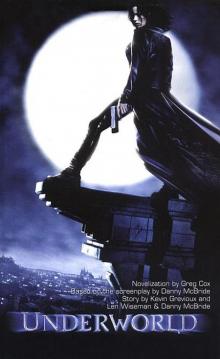 01 - Underworld
01 - Underworld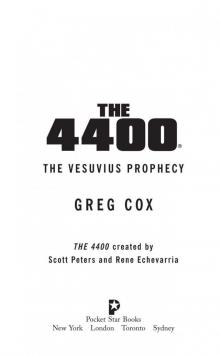 The 4400- the Vesuvius Prophecy
The 4400- the Vesuvius Prophecy Assignment: Eternity
Assignment: Eternity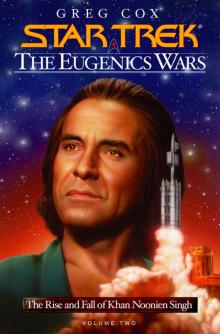 The Eugenics Wars, Vol. 2: The Rise and Fall of Khan Noonien Singh
The Eugenics Wars, Vol. 2: The Rise and Fall of Khan Noonien Singh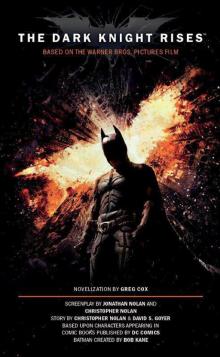 The Dark Knight Rises: The Official Novelization
The Dark Knight Rises: The Official Novelization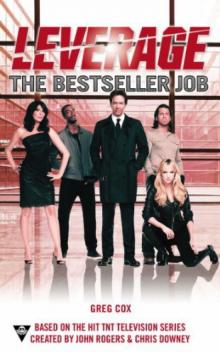 The Bestseller Job
The Bestseller Job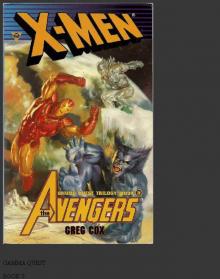 X-Men and the Avengers: Friend or Foe?
X-Men and the Avengers: Friend or Foe?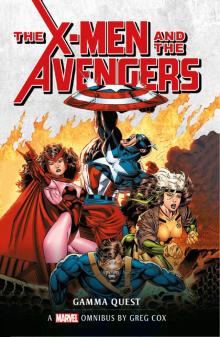 Marvel Classic Novels--X-Men and the Avengers
Marvel Classic Novels--X-Men and the Avengers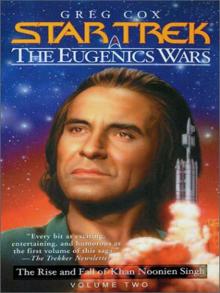 STAR TREK: TOS - The Eugenics Wars, Volume Two
STAR TREK: TOS - The Eugenics Wars, Volume Two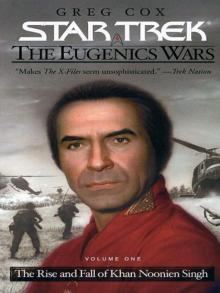 STAR TREK: TOS - The Eugenics Wars, Volume One
STAR TREK: TOS - The Eugenics Wars, Volume One The Black Shore
The Black Shore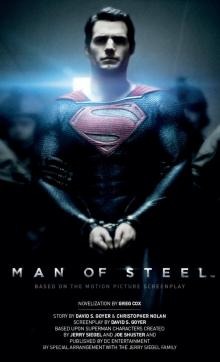 Man of Steel: The Official Movie Novelization
Man of Steel: The Official Movie Novelization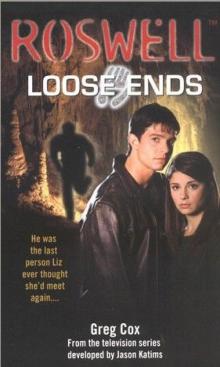 Loose ends r-1
Loose ends r-1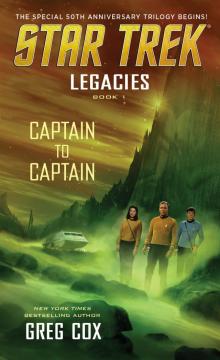 Legacies
Legacies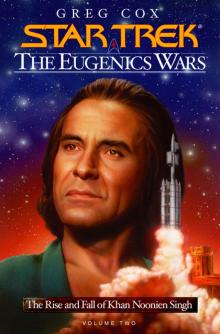 The Eugenics Wars, Volume Two
The Eugenics Wars, Volume Two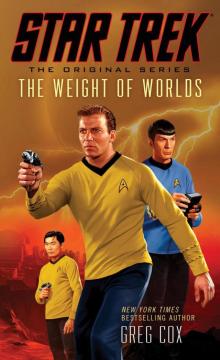 Star Trek: The Original Series - 148 - The Weight of Worlds
Star Trek: The Original Series - 148 - The Weight of Worlds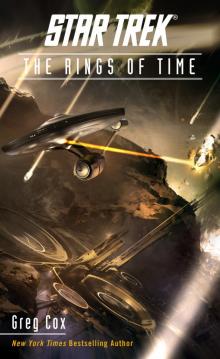 Star Trek: The Original Series: The Rings of Time
Star Trek: The Original Series: The Rings of Time Godzilla--The Official Movie Novelization
Godzilla--The Official Movie Novelization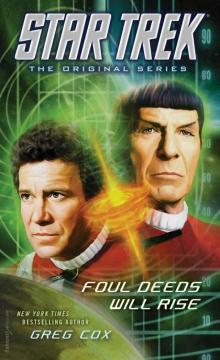 Star Trek: The Original Series - 160 - Foul Deeds Will Rise
Star Trek: The Original Series - 160 - Foul Deeds Will Rise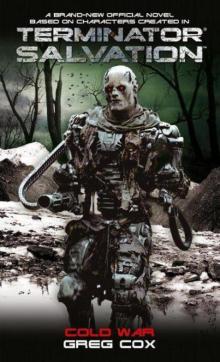 Terminator Salvation: Cold War ts-3
Terminator Salvation: Cold War ts-3 Star Trek: The Original Series: Miasma
Star Trek: The Original Series: Miasma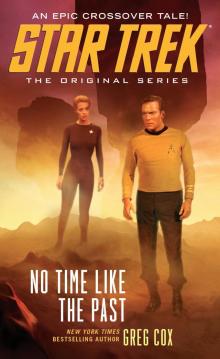 Star Trek: The Original Series: No Time Like the Past
Star Trek: The Original Series: No Time Like the Past Child of Two Worlds (Star Trek: The Original Series)
Child of Two Worlds (Star Trek: The Original Series) THE 4400® WELCOME TO PROMISE CITY
THE 4400® WELCOME TO PROMISE CITY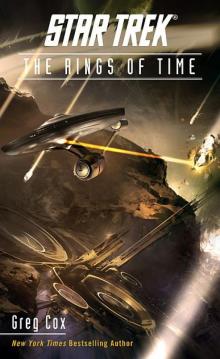 Star Trek: The Original Series: The Rings of Time (star trek: the original series)
Star Trek: The Original Series: The Rings of Time (star trek: the original series) To Reign in Hell: The Exile of Khan Noonien Singh
To Reign in Hell: The Exile of Khan Noonien Singh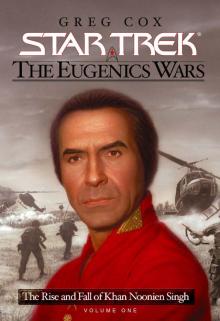 Star Trek: The Eugenics War, Vol. 1
Star Trek: The Eugenics War, Vol. 1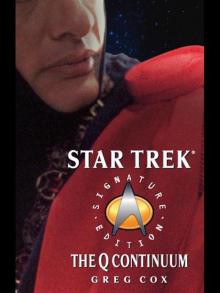 The Q Continuum
The Q Continuum